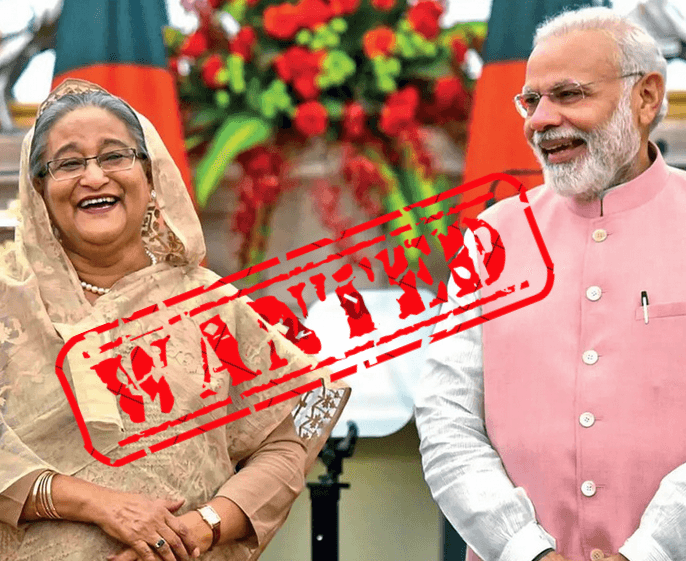Bangladesh Demands Extradition of Former PM Sheikh Hasina from India
Bangladesh Demands Extradition of Former PM Sheikh Hasina from India Amid Judicial Proceedings

Bangladesh has formally requested the extradition of its former Prime Minister, Sheikh Hasina, from India. Hasina, who fled to New Delhi in August 2024 after being ousted from power, faces numerous allegations, including crimes against humanity and financial misconduct. The diplomatic move has added strain to the relationship between the neighboring South Asian nations.
Bangladesh Sends Diplomatic Note to India
The acting head of Bangladesh’s foreign ministry, Touhid Hossain, confirmed on Monday that a formal request had been sent to India.
“We sent a note verbale to the Indian government saying that the Bangladesh government wants her [Hasina] back here for judicial process,” Hossain told reporters. The specifics of the judicial process remain undisclosed.
India’s Ministry of External Affairs acknowledged receipt of the request, stating, “At this time, we have no comment to offer on this matter.”
Background: Hasina’s Fall from Power
Sheikh Hasina’s 15-year rule came to an abrupt end in August 2024 following massive protests against her administration. The unrest, marked by violent clashes, resulted in over 750 deaths and thousands of injuries, primarily among the youth.
The interim government, led by Nobel laureate Muhammad Yunus, has taken a firm stance on holding Hasina accountable. Yunus has publicly criticized Hasina for continuing to comment on Bangladeshi politics from India.
“We will seek the return of the fallen autocrat Sheikh Hasina from India,” Yunus declared in a recent press briefing.
Charges Against Sheikh Hasina
Hasina faces a slew of allegations, including:
- Crimes Against Humanity: Accusations related to the deaths of protesters during her administration’s crackdown.
- Genocide and Murder: Claims of systematic oppression and violence against political opponents.
- Corruption: Alleged embezzlement of $5 billion connected to the Rooppur Nuclear Power Plant, a Russian-backed project.
Bangladesh’s Anti-Corruption Commission has launched a detailed investigation into the financial irregularities surrounding the nuclear project, stating that it involves “kickbacks, mismanagement, money laundering, and abuse of power.”
The Dhaka-based International Crimes Tribunal has issued arrest warrants for Hasina and her close aides. Interpol has also been approached for assistance in locating and apprehending the former leader.
Strained India-Bangladesh Relations
This extradition request comes at a sensitive time, as the two nations recently discussed mending ties during a visit by India’s foreign secretary to Dhaka. Historically, India has been a key ally of Sheikh Hasina and her party, the Awami League, making the current situation diplomatically delicate.
While India and Bangladesh share an extradition treaty, signed in 2013 and amended in 2016, the process of extraditing a political figure of Hasina’s stature is fraught with complexities.
Calls for Fair Judicial Process
Human rights organizations, including Human Rights Watch, have urged Bangladesh to ensure that any legal proceedings against Hasina meet international standards. These groups have also called for the abolition of the death penalty in cases related to the International Crimes Tribunal, emphasizing the need for a fair trial.
As Sheikh Hasina’s future hangs in the balance, the extradition request underscores the evolving political dynamics in Bangladesh and its relationship with India. The international community will be closely monitoring how the situation unfolds, particularly in terms of human rights and diplomatic integrity.
Extradition Request: Bangladesh has formally asked India to extradite former Prime Minister Sheikh Hasina, who fled to New Delhi in August 2024 after her ousting amid protests.
Charges Against Hasina: Accusations include crimes against humanity, genocide, and corruption, including embezzlement of $5 billion linked to the Rooppur Nuclear Power Plant project.
Interim Government's Stance: Led by Nobel laureate Muhammad Yunus, the government is determined to hold Hasina accountable and has criticized her political commentary from India.
Human Rights Concerns: Rights organizations have urged fair trials and the abolition of the death penalty for tribunal cases in Bangladesh.
Diplomatic Relations: The request could strain India-Bangladesh relations, testing their 2013 extradition treaty and historical ties.
Global Attention: The situation has drawn international scrutiny over the judicial process and political dynamics in the region.
About the Author
Michael
Administrator
Michael David is a visionary AI content creator and proud Cambridge University graduate, known for blending sharp storytelling with cutting-edge technology. His talent lies in crafting compelling, insight-driven narratives that resonate with global audiences.With expertise in tech writing, content strategy, and brand storytelling, Michael partners with forward-thinking companies to shape powerful digital identities. Always ahead of the curve, he delivers high-impact content that not only informs but inspires.



